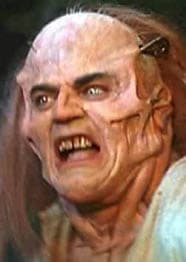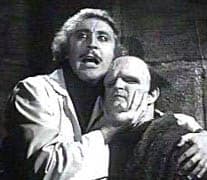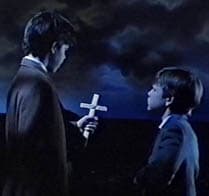Frankenstein
Critique • Text • Frankenstein at the movies
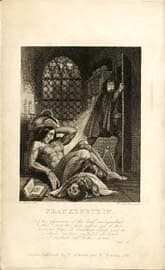 Frontispiece, first illustrated edition 1831
Frontispiece, first illustrated edition 1831Original title
Frankenstein; or, The Modern Prometheus
First publication
1818
Literary form
Novel
Genre
Literary, science fiction, horror
Writing language
English
Author's country
England
Length
Approx. 78,000 words
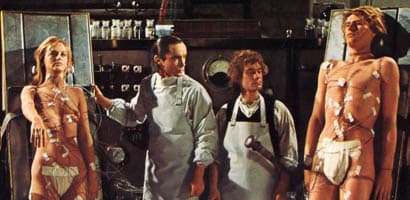
Udo Kier's overacting as the mad doctor is the best and funniest part of Flesh for Frankenstein.
Frightfully funny and bizarre
Flesh for Frankenstein (1973): Also known as Andy Warhol's Frankenstein; film, 95 minutes; director Paul Morrissey; writer Paul Morrissey; featuring Joe Dallesandro, Udo Kier, Monique van Vooren
Young Frankenstein (1974): Film, 105 minutes; director Mel Brooks; writers Gene Wilder, Mel Brooks; featuring Gene Wilder, Peter Boyle, Marty Feldman, Cloris Leach, Madeline Kahn, Teri Garr
Frankenstein Unbound (1990): Film, 85 minutes; director Roger Corman; writers Roger Corman, F.X. Feeney; featuring John Hurt, Raul Julia, Bridget Fonda, Nick Brimble
Frankenstein and Me (1996): Film, 85 minutes; director Robert Tinnell; writers Richard Goudreau, David Sherman, Tinnell; featuring Jamieson Boulanger, Ricky Mabe, Polly Shannon, Burt Reynolds, Louise Fletcher, Ryan Gosling
As the Hammer Frankensteins wound down, other films featuring the creature or creator took some decidedly weird turns. Some of them are still worth a look or a giggle.
Creatures of flesh
Flesh for Frankenstein (1973, also known as Andy Warhol's Frankenstein) is for those with peculiar tastes—for campy, gory silliness presented with laughingly bad effects, over-the-top acting and a script that makes little sense. In other words, a taste for bad cinema, some would say.
Others rave over this film as ahead of its time, a hoot in a class with Rocky Horror Picture Show.
But I'm with the naysayers here. Flesh for Frankenstein is not even a competently directed parody. The low point comes when Baron Frankenstein tries to animate his female creation (I think) by having intercourse with her gall bladder (I think).
Actually that does sound kind of funny in print but on the screen it's another static, overlit, boringly shot scene.
Udo Kier, however, made a cult name for himself by ridiculously overacting the title role.
Frankenstein's male creation is played by a young Serbian who, both before and after his transformation into the monster in this film, appears to have no clue how to act. He just sulks unconvincingly and turns his head left and right as directed. (I believe the actor never appeared in another film after this.)
Director Paul Morrissey made Flesh for Andy Warhol's Factory in tandem with the equally awful Blood for Dracula. In both films he shows pretensions of being an artistic director in the mould of Fellini or some other such European master, but instead reveals himself to be another Ed Wood—with more money.
The movie was initially presented in 3D, which I haven't seen. Perhaps all that raw, bleeding flesh takes on deeper meaning when it's thrust at you three-dimensionally.
Time-travelling Frankenstein
Frankenstein Unbound (1990) is a curiosity. First, it's based not on Shelley's story but on a 1973 novel by British science fiction writer Brian Aldiss.
Second, it's directed by Roger Corman, the king of B movies but stars some A-list actors.
John Hurt is the twenty-first-century scientist whose experiments with weapons of mass destruction go awry and cause him to be hurled back into the past where he meets Doctor Frankenstein (Raul Julia), Mary Shelley (Bridget Fonda), Percy Bysshe Shelley (rock star Michael Hutchence), Byron (Jason Patric), and of course the monster (British TV actor Nick Brimble).
He also has a talking computer-driven car, which helps him get around the old countryside.
Needless to add, the plot often makes no sense. Although the production had a budget bigger than most Corman films, the film appears cheaply made and offers only low-to-medium entertainment value—unless you're a bad-movie buff, in which case, enjoy.
You big chucklehead
Young Frankenstein (1974) on the other hand is a genuinely funny spoof on the genre, one of Mel Brooks's comedic masterpieces.
The cast is hilarious: Gene Wilder (who co-wrote the film with Brooks) as the doctor, Peter Boyle as the monster, Marty Feldman as Igor, and Madeleine Kahn as the doctor's sex-tease of a fiancée, plus Cloris Leachman and an early Teri Garr. Also watch for a sequence featuring a hard-to-recognize Gene Hackman as the blind man who befriends the monster.
Wilder is actually Frederick Frankenstein, the grandson of the infamous Victor Frankenstein, who dissociates himself from his forbearer by pronouncing his surname Frawnk-en-shteen. But after he inherits his grandfather's castle laboratory, he is soon caught up in the same old attempt to create life from dead body parts.
The script is spot-on in its loving deconstruction of the typical old Hollywood approach to horror films. This black-and-white movie imitates the first three Universal films so closely it could at times be mistaken for them. The humour is tempered, offering only a few outright yucks but lots of knowing chuckles.
Quite a few fans of the genre give this comedy higher marks than the classics it lovingly parodies, for good reason.
Frankenstein, bro
If you're over twelve, don't bother with Frankenstein and Me (1996). This is an interesting little Canadian production but it's really for kids.
Teenager Earl Williams is obsessed with monsters. His fantasies are shown in the re-enactment of several famous horror scenes from old movies (including a great take on Hammer's Brides of Dracula) with children in all the roles. Then Earl finds the possibly real Frankenstein's monster, which has been lost by a travelling carnival, and he sets about trying to re-animate it. The creature is only on screen intermittently and in its tatty rags looks more like The Mummy than the Frankenstein monster we know from old films.
But this part of the plot goes nowhere, as attention is shifted to Earl's relation with parents and friends.
Burt Reynolds phones in his part as the kid's dreamy father and Louise Fletcher does her usual Nurse Ratched bit as a forbidding teacher who picks on Earl. In the end we're left not knowing the monster's fate as the focus remains on the family morality tale.
Watch for a cute young Ryan Gosling in a small role.
— Eric
Critique • Text • Frankenstein at the movies
1931, 1935, 1939, 1942–1948, 1957, 1958–1970, 1973–1996, 1994, 2014


